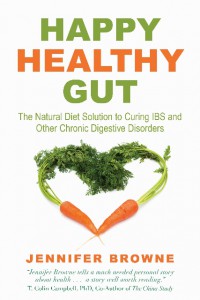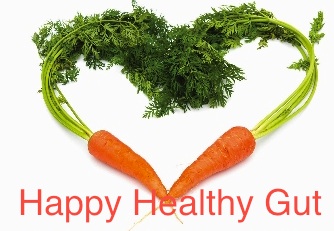Given that Vancouver took first place in Best Health Magazine’s Canada’s Healthiest Cities 2008,[1] and the more recent launch of Vancouver’s Healthy City Strategy in 2012,[2] I don’t feel like I’m going too much out on a limb when I assume that a large percentage of Vancouverites are actively seeking to both look and feel their best this year.
2014—the year for self-improvement. This year, we will be happy, healthy, and make it a priority to maintain a high level of general wellbeing.
On a personal level, I’m someone who is greatly motivated to continue with a health initiative I began for myself just over three years ago—one that involved ditching my digestive disorder and getting on with my life, both happily and healthfully.
And I did it! And then I wrote about it.
Happy Healthy Gut is a personal story of triumph combined with both trial-and-error and scientific research to determine what might be making us sick. The results? How you feel is directly correlated with what you feed yourself. It might not sound revolutionary, but how many readers out there know someone suffering from a chronic disease? Long-term disorders like arthritis, heart disease, diabetes, gastrointestinal disorders and even certain cancers are incredibly prevalent these days.
Sure, early detection is one of the reasons why we all know so many people suffering from these illnesses, but what’s the other common denominator?
Food.
Our food has become weak, and so have we. Today, most of the food we choose to nourish ourselves with has been chosen because of its convenience, cost, and marketing. We love drive-thrus, cheap food, and stuff that we’ve seen on television. Period. But it’s not our fault—we are being marketed to more than ever before. Our food is being industrially prepared for us more than ever before. And we’re less active than we’ve ever been before.
It’s hurting us, but we can do something about it.

While Happy Healthy Gut is primarily about eradicating digestive disorders through adopting mindful eating habits, it’s also about becoming our own best advocates when it comes to our health. We can begin to think food-forward, which involves taking the proverbial bull by its horns and assessing whether that lunch we’re about to chow down on will either help or hinder your body—because it can only do one or the other. Will it nourish us and contribute to growth and repair, or will it simply satisfy our immediate caloric needs?
Here are some ways that we can immediately begin to eat more healthfully:
- Shop the perimeter of the grocery store. The outskirts of most conventional grocery stores are usually home to the main food groups, and they are typically less processed. Avoid the center aisles as much as possible.
- Try and purchase locally-produced foods. Buying local doesn’t just mean supporting local businesses—it also means getting your hands on food that is fresher and has spent less time on a truck. This, in turn, means more nutrients are retained in those foods.
- Buy organic when you can. Invest in your health—think preventatively instead of waiting until you don’t feel well. You’ll pay more for organic food, but there’s a reason. Buying organic means that fewer chemicals will end up on your plate. Like the saying goes, you get what you pay for.

- Remember that most of what you eat should be fruits and vegetables. As a country, we are skimping on these, and it’s not helping us. Keep in mind that these foods are alive. They carry antioxidants to help fight free-radicals, and are teeming with micronutrients that your body needs. Don’t ignore them—stock up.
- Pack and bring your lunch to work. Eating out less means consuming fewer calories, and often way more nutrients. It also saves money.
- Eat mindfully. By taking the time to slowly chew your food and sit down while you eat, your stomach and brain can communicate more effectively about how full you are. You end up eating less when you make time for a real lunch, not one eaten in Vancouver’s notoriously heavy (and frustrating) traffic.
Training ourselves to think food-forward will only lead to better health outcomes—and a better YOU, beginning now. 2014 is YOUR year. Live it YOUR way. Be happy. Be healthy. Be YOU, only better.
Cheers to a new year, new eating habits, and a new and improved you. Eat well; be well.

